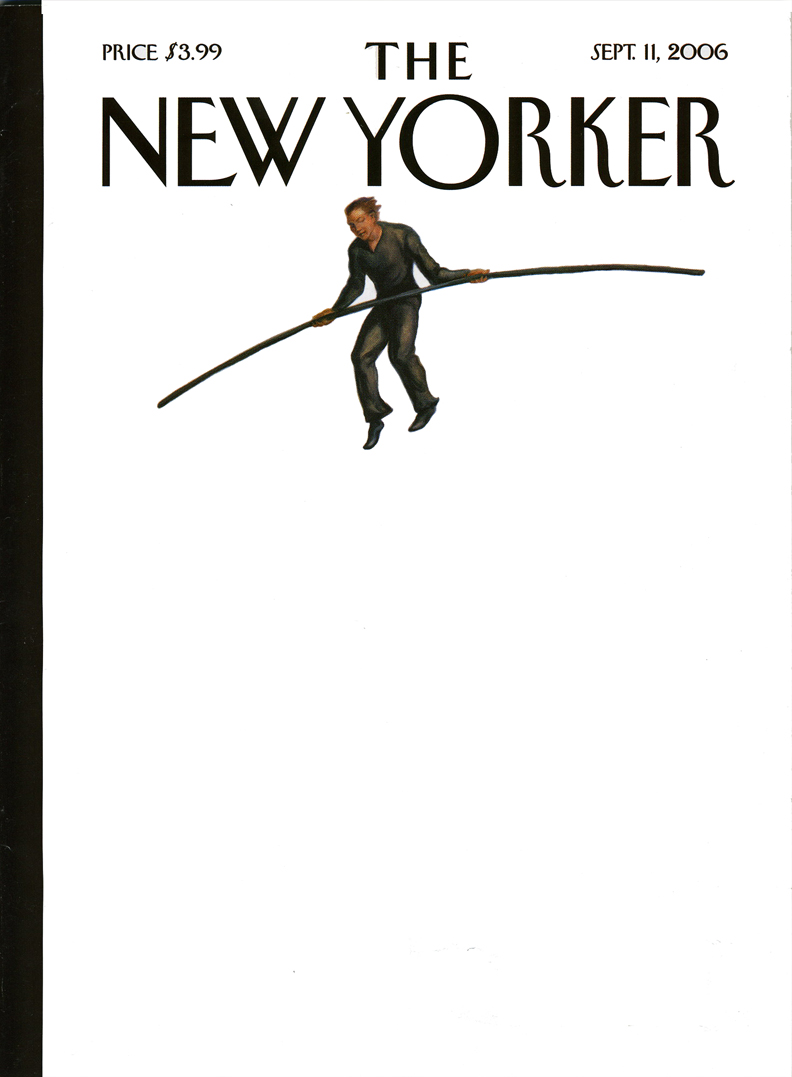In Which That Is All I Am Painting For
 Wednesday, December 24, 2008 at 3:31PM
Wednesday, December 24, 2008 at 3:31PM 
Pink Times For Pink Ladies
by Will Hubbard
I paint what I see, not what you hope that I see.
- Lucian Freud
Everything in the New Yorker is pink. A pink devoid of any symbolism, but still a very distinct pink, meaning it has a color. By which I mean it has a flavor, too, and a scent, a lovely one. Even the font does not change.

Such a pink magazine has mostly articles. They are funny and vibrant, intelligent in a most acceptable way. I would call it cogitation. Unfortunately, poetry is not cogitation. Not to say that poetry is anything in particular, but it is not cogitation. Nor is it pink.

This is not humor. This is the opposite of humor.
A magazine is a tank of water. The water at the New Yorker has been dyed pink. Everything that is dropped into that water turns a faint shade of pink. Which is not to say that it becomes any less lovely. Because it doesn’t, it's just pink.

The New Yorker has a font. It is distinct and they own it. When they print poems they print them in this font. This font is metaphorical. I am using it metaphorically. It means that what is in the poems does not matter. Good or bad, they are still pink, same as the rest.

Pink sells. The New Yorker does not sell sex, it sells well-formed ideas. For the most part, this makes for a good magazine. In the case of poetry, however, it does not.

As the painter Philip Guston says, "the most clearly articulated thoughts are usually wrong." This applies more to poetry than it does to articles and other cogitations. People like to have well-formed ideas at hand, even if they aren’t going to use them. Poems need not concern themselves with well-formed ideas, because no poem will be as good a cogitation as a New Yorker article.

When you are listening to an information session, it works best to pay little if no attention to whomever is talking. This way, you will only pick up on the interesting ideas. Everything else will be a distraction, in that you already know it even if you have never heard it before. This applies also to poetry, but not to the New Yorker.

It is better if a poem can be the color it is, rather than pink, or an equally arbitrary blue? Picking a color for a poem is not arbitrary, from the perspective of the poet. Nor is it cogitative. If a poem is to be dropped into a magazine, the water should be clean and warm. This is true even if the eventual color of the water is brown. More often, I think clean water will hold its own, keeping the fish healthy and happy.

Philip Guston is a lovely painter. I’m sure there has been an article about him in the New Yorker, and equally in the New Yorker’s font. Philip Guston loved the color pink, but not the same hue as the New Yorker pink. There is thus little relationship between Guston and the New Yorker, except that someone may have formed some complete and formidable thoughts about Guston’s paintings in the New Yorker.

Philip Guston had some friends that wrote poetry. Some, in their old age, have probably published poetry in the New Yorker. These were pink poems, every one of them, which is not meant pejoratively. Nor is it meant metaphorically. It simply means that these poems were in the New Yorker, and therefore pink.
The New Yorker has little if nothing to do with the New York School of poetry, which itself has little to do—in that it’s a name—with the poets who created it. There is a contradiction in this fact, but not a simple one. It has to do with a city being a tank of water, like a magazine. New York City is somewhat pink, but with a healthy amount of orange mixed in. This comes from the lights and air additives.

This is not to say that a magazine should not pick a font. But eventually all you can see is the font, which is a bad thing. Even beautiful rooms like to be redecorated. The implication is that rooms have opinions about how they should look.

The tulips that bloom heavily in the spring are sometimes pink. The rings around the eyes of an alcoholic or meth-addict are also sometimes pink. The poetry published in the New Yorker are, like the articles and cogitations, pink. Thus, you see there is nothing pejorative or metaphorical about my saying the New Yorker makes everything a faint sickly shade of pink. Oh, some meats are pink, too.

When poetry does occur in the New Yorker, it is like a tulip. Tulips flower in New York City even with the artificial light and air additives. Not to say that they are beautiful, because even flowers can be ugly when soaked in dog piss. Poems in the New Yorker can be beautiful, but not in the New Yorker. Every poem has its own natural color, and almost no colors look good when imbued with pink light. Pink poems, however, which are written and sent to the New Yorker, look great in pink light, but nowhere else.

Almost everything I have said here applies equally to the Paris Review. Paris is nice, somewhat grey-blue.
William Hubbard is the contributing editor to This Recording. He lives in Williamsburg.

"Smile" - Robert Downey Jr (mp3)
"Broken" - Robert Downey Jr (mp3)
"River" - Robert Downey Jr (mp3)

PREVIOUSLY ON THIS RECORDING
Will used Cesare Pavese as a catapult.
Alex brings the Creeley/Olson correspondence to the masses.
Will takes Gertrude Stein out for a spin.






























